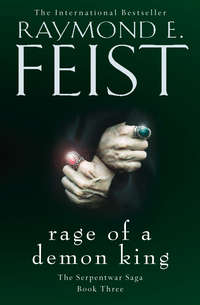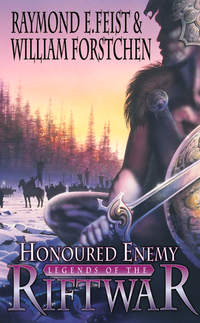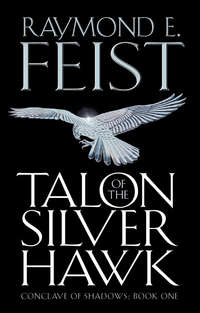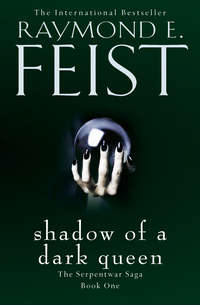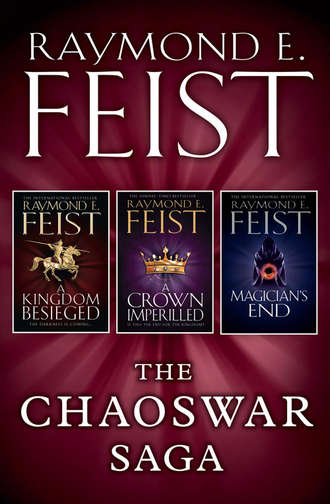
Полная версия
The Chaoswar Saga: A Kingdom Besieged, A Crown Imperilled, Magician’s End
That left the boys: Ty knew a little of his father’s role in destroying those who had nearly obliterated his people, the Orosini of the Mountains, a tribal people who were slowly reclaiming their heritage. Many like Tal and his wife, Teal, had spent too many years in cities, years which had blunted their interest and ability to live the old life. It was a life of which Ty knew nothing.
Jim turned to see Henry smiling at a joke Tad had made and thought: there’s a prince without a principality. He had grown up with conDoin kings, as had every other citizen of the Kingdom of the Isles. They were the founding dynasty; they had united the tribes on the Island of Rillanon and spread their banner to the mainland, eventually conquering enough territory to create a nation to rival Great Kesh on this continent.
But it was a dynasty at its end, Jim feared. The vigour was gone, the energy and drive that had given the line a rebirth after the short unhappy reign of Rodric IV. His successor, Henry’s great-great-uncle, Lyam I, had been a great king, a charismatic leader who had inspired love and loyalty in his people after twelve brutal years of war with the invading Tsurani.
Tragedy had kept Lyam from having a son, so the crown went to Borric II, his nephew, who proved as apt and able a ruler as his uncle. Borric’s twin brother, Prince Erland, had been as able in his role as his brother and between the two of them the Kingdom of the Isles had been well served.
But Borric’s son Patrick had been the last of the able rulers and Patrick’s son Gregory had no heir, For the third time since the conDoins took the crown of the Isles, there had been a chance for multiple claimants to the throne. The last time civil war had been stemmed by Henry’s ancestor Martin renouncing the crown for himself and his heirs. But the time before that a great deal of blood had been shed before Borric I took the head of Jon the Pretender.
And the last thing Jim wished to contemplate was a kingdom divided on the eve of what he was certain was going to be a major war with Great Kesh.
‘Lost in thought?’ asked Tal.
Jim smiled. ‘Yes.’ He glanced around the table then said, ‘Tal, could we have the room?’
Tal nodded. The other dinner guests had left an hour before and with a quick word to the serving staff, who hurried to the kitchen, the room was empty save for Jim and his guests.
‘Not to belabour the point, but I’m certain war is coming,’ said Jim. He held up his hand before questions could be asked. ‘I will sum up. There are factions within the Imperial Keshian Army, specifically within the Inner Legion, who are calling for expansion.’
Tad interrupted. ‘The Vale of Dreams?’
‘Traditionally that’s always been their first target. The Vale is the lushest farmland on Triagia and because of the constant warfare, sparsely populated. A colony of Keshian or Kingdom farmers there could double the region’s output of farm goods within two years, tenfold in five.’
Henry was silent, but he knew he had suddenly been propelled into something far more important than a pleasant social evening.
‘But this is something massive. On a far greater scale, perhaps, than we’ve ever seen. A fleet of perhaps as many as three hundred ships departed Hansulé recently, sailing south.’
Jommy looked confused. ‘South? Are they sailing to Novindus?’
‘My best guess is around the southern coast between the Lost Forest and the Island of Snakes and then up to Injune or Elarial. From there …?’ He shrugged.
‘If they mean to take the Vale,’ said Tad, ‘they could be supported out of Durbin. They’d need a fleet that big to keep the Quegans from getting involved as well as keeping the Kingdom’s Western Fleet in Port Vykor busy.’
‘They could go anywhere.’ He looked at Henry and said, ‘Including the Far Coast. The Prince of Krondor has called the Western Muster.’
Henry, Tal, and Ty knew this from two nights before, but Tad, Zane, and Jommy all looked surprised. ‘War footing on the Far Coast?’ asked Jommy. ‘Is it that dire?’
‘I think so.’ Jim pushed himself back from the table. ‘And I need to travel, so to the end of this night, let me add this.’ He looked at Tal. ‘While I’m gone, I would appreciate it if you would agree to aid these other three in their charge.’ Both men knew Jim wasn’t speaking of any political loyalties, but rather Tad, Zane, and Jommy’s responsibility to the Conclave of Shadows. ‘I know your relationship to our mutual friends is complicated, but I trust you implicitly.’
‘I’ll do what I can,’ said Hawkins, and Jim knew that was as good as a promise.
‘Gentlemen,’ he said to the three foster-brothers, ‘I leave this to you. You’ve never failed me or the crowns of Isles or Roldem, and I expect you won’t now.’
Henry looked confused. ‘I’m not sure I understand. I’m not even sure why you asked me here.’
Jim moved around the table and put his hand on Henry’s shoulder. ‘These four men – and young Ty there – are going to take my place while I’m gone. In my absence you’re to consider them your protectors.’
‘We will do whatever is needed,’ said Zane.
‘Yes,’ agreed Tad.
‘I don’t understand. What is “whatever is needed”?’ asked Henry.
It was young Ty who answered. ‘Too much wine? You’re a little slow today, Hal. They’re going to keep you alive when Kesh sends assassins to kill you.’
• CHAPTER SIX •
Muster
MEN SHOUTED ORDERS.
Brendan and Martin sat their mounts beside their father, watching and learning as much as if they were also on the muster field. In the distance the archers were shooting at the butts, large piles of loosely-packed earth, each with a target before it. Unlike the King’s army, the Western Muster had no company of fletchers planing arrows, flocks of geese to cull for the arrow flights, or a score of blacksmiths turning out steel arrowheads. Each man of the muster would be given a freshly-made longbow, a score of arrows, and when he was home he’d be obliged to practise for an hour a morning on the butt he’d build alongside his hut, home, or barn. Should a man return with less than eighteen arrows intact, he would be fined a copper coin for each additional replacement beyond two.
Such was the state of military economy in the Western Realm of the Kingdom.
As soon as Reinman and his drunken weather magician had left Crydee, the Duke had begun the muster. This group was the second of three that would train here. It was difficult for the frontier duchy, for there were farmsteads scattered along the entirety of the Far Coast.
Martin looked over at the makeshift workshed where two experienced bowyers, with the help of their apprentices, showed five young men how to turn thick yew branches into bow staves. He remembered his own time in the shed and remembered the other woods that could be used: ash, some oaks, and elm, but yew wood was the finest. He recalled the delight he had felt when he had turned his first branch into a stave and the elder bowyer had studied it and proclaimed it well done, seeing how Martin had shaped it with the heartwood at the grip and along the rear spine, the sapwood in front, an ideal natural lamination that was the best a simple bow could be.
It was ironic, though Martin found no humour in it, that as much as he had enjoyed making that bow, he had been a terrible archer. Not really terrible, he amended as he gave himself some credit, but average. His younger brother and even Bethany were better archers. Having equalled his elder brother Hal didn’t placate the dour young man; Hal was the finest swordsman in Crydee, perhaps in the world if he won the Masters’ Court. Martin disliked constantly being second to others, though there was no one else in Crydee besides Hal who could best him.
Glancing to where Lady Bethany approached beside her father, he realized he was frowning and forced himself to a smile.
‘Robert!’ the Duke said, ‘I didn’t expect you back so soon. Lady Bethany, always a pleasure. Robert, did your wife not travel with you?’
‘She’s not one for long rides,’ said Earl Robert. ‘And I felt the need to come along quickly with some news.’
Duke Henry said, ‘Boys, keep the men at it. They’re lagging in the afternoon heat. No stopping until the supper bell rings.’
His sons indicated they would and watched as their father and Lord Robert rode off a short distance. Bethany rode up and turned her horse so that she was alongside Martin’s. ‘Well, I guess you didn’t expect to see me again so soon?’
Brendan’s eyes narrowed slightly. She had her head cocked as if she were looking past Martin at him, but her eyes were trained on Martin’s face, while he seemed intent on overseeing a sloppy drill of swordsmen banging away with practice swords against one another’s shields. Despite being made of wood, the swords and shields were actually heavier than their metal counterparts so that when the footmen went to battle, the equipment would be lighter than what had become familiar to them. The same was true of the heavy pikemen and spearmen running with their weapons across a distant field.
After a second too long, Martin glanced at her and said, ‘What? Oh, yes. Always a pleasure to see you, Bethany.’ But then something caught his eye and he shouted, ‘You, there!’ He put his heels to his horse’s sides and moved out, circling around the duelling footmen, then dismounted. Taking one man’s place he took his sword and shield and demonstrated how the combat practice was supposed to be conducted. A sergeant of the castle guard saw the young lord dismount and came over to see what was happening.
Martin threw himself into the drill and delivered two ringing blows that soon had his opponent stumbling backwards.
‘What do you think that’s about?’ asked Bethany. Brendan glanced her way and said, ‘I have no idea.’ Bethany started back to where her father and the Duke were finishing their private chat. As the youngest son watched her go, he saw her turn again to stare at Martin. With a sigh, he said to himself, ‘Then again, maybe I do.’
The evening meal was a mixture of light banter interspersed with moments of quiet as everyone seemed caught up in their own thoughts. Martin and Bethany appeared to make a point of ignoring one another and Brendan was troubled by it.
The four of them had been raised together for as long as Brendan could remember. It was always assumed that some day Bethany would wed Hal, but Brendan now realized that was only an assumption, one that his father or mother had never spoken of; and right now he knew one thing, though he wasn’t sure he fully understood it. Something had changed between Bethany and Martin on her last visit. Without words, their feelings for each other had shifted. Martin had said nothing to his brother; not that he would, for Martin most among the family always kept his own counsel. But Bethany was also distant, chatting with his mother and managing somehow to avoid all the male members of the household as well as her own father.
He was currently lost in conversation with Brendan’s father, who had as yet to tell his sons why Earl Robert had appeared unexpectedly. Brendan balanced his youthful impatience with the knowledge that his father would tell him what he needed to know when he saw fit. Realizing there was no further reason to remain at the table, he said, ‘Father?’
‘Yes?’
‘It’s been a long day. If you permit I’d like to turn in early.’
A little surprised by his usually rambunctious youngest’s request, the Duke waved permission and Brendan nodded to the others at the table and departed. A sudden sinking feeling in the pit of his stomach told him that no matter what else, little good could come out of what was passing between Martin and Bethany. With a fatigued sigh, he pushed open the door to his quarters and threw himself down on his simple bed. Rolling over, he stared at the stones of the ceiling and thought: perhaps the war will distract the two of them.
After the guests had retired Duchess Caralin turned to her husband. ‘Bed?’
Duke Henry sat on a divan, a recent addition to the old castle’s private quarters. The room had been used since the castle’s construction as an informal meeting room and the Duke had also decided it was ideal place for his family to spend time together; Henry found it far more convivial than the draughty great hall. He looked up from his musing and smiled. ‘No, a while longer I think. I have much to think about.’
Caralin tilted her head to regard her husband. They had spent nearly thirty years together and at times she knew him better than she knew herself, yet at moments like this she didn’t have a clue as to what he was thinking. ‘Robert’s news must have been very troubling.’
Henry’s eyes widened and he sat up a bit straighter. ‘Oh, that. No, that’s not it at all.’ He motioned for her to return to the divan and as she sat down he said, ‘I’m sorry. I should have mentioned that to you and the boys. Robert wanted to share some information about our neighbours to the east, the elves in E’bar.’
‘Oh,’ she said, her brow furrowing a little. ‘I thought it had to do with the coming war.’
‘It may, truth to tell,’ said her husband. ‘I hope not. I asked Robert to send a messenger to their Lord Regent informing him of the possibilities of conflict in the area. I had Robert stress that it likely would be nothing of import, just a precautionary warning.
‘The messenger rode for three days to the gates of their city and was stopped. According to Robert, whatever passes for a sentry officer with these elves refused to let him into the city, took the message, and turned the rider away.’
‘Well, he got the message then, didn’t he, this Lord Regent?’
‘Yes, but that’s not the point, dear. Nor is the poor treatment of the messenger. Elven manners are not our own. We have always been on good terms with the Elf Queen and her court to the north, but these newcomers are a different stripe of cat, I’m afraid. No, it’s what the officer said to the messenger.’
‘What was that?’
‘Any human who trespasses on the land of the taredhel – as they call themselves – would be “dealt with”.’
‘That sounds unfriendly.
‘Yes,’ he agreed with a slowly released breath, sounding fatigued. ‘If the Keshians come and these elves remain neutral, that’s one thing. If they close their borders entirely—’
‘Anyone fleeing eastward will be trespassing on their territory.’
As always, you grasp the heart of the matter.’
Softly, as if not to be overheard, she said, ‘Do you think ... we may have to flee?’
‘No, no,’ he said, hugging her for reassurance. ‘I’m just trying
to anticipate every possibility, my love.’ He kissed her cheek, then smiled as he looked into her eyes. ‘The Keshians moving against the Far Coast? Why would they do that?’ He stood and put out his hand, and she took it, and rose. ‘There’s nothing here they could possibly desire. Forests? Farms? They have ample forests and farms in the Empire of Great Kesh. No, they’ll almost certainly move against the Vale of Dreams again. And the Prince of Krondor will order Lord Sutherland and the Knight-Marshal of the West to drive them back, and when the dust settles, the old lines will be drawn again, with a jot of difference here, a smidgen of change there.’
Gripping his arm and walking closely at his side, Caralin said, ‘I hope you’re right.’
Silently he nodded, knowing he probably was, but prepared for being utterly wrong. As many married couples do, they conspired to walk together silently, not needing to say another word.
Pug sat behind his desk, as he had for countless days since coming to the island. But unlike most days, his mind refused to grapple with the problems before him. Instead it kept returning to Brandos’s question about rebuilding the villa.
He had no good reason for considering it. He found himself unable even to imagine beginning the work. He knew that with a small group of skilled craftsmen from the mainland, and some magic provided by Magnus and himself, the villa could be resurrected in months, rather than the years it had probably taken the original inhabitants of this island.
Yet something in him became angry at the very thought of rebuilding his home. It was as if even to think about it was to diminish the loss he still felt.
After Miranda had died his otherwise steely resolve had wavered. He had revisited that last moment of her life countless times, seeing it over and over again in his mind. If I had been a moment quicker, he thought to himself, or if I had seen the demon move an instant earlier … He knew the futility of this sort of thinking. He was over a hundred years old and had watched many people die unfortunate deaths – far more than had passed on in the fullness of their years – yet this death haunted him.
Yes, she had been his wife, and he had loved her …
Pug sat back and sighed. He reached for the pot of tea that had been sitting on his desk all morning and found it empty. He could ring a bell and someone would bring him a new pot. He looked at the mess his desk had become and realized he could ring that same bell and someone would sort out all the clutter. He then found himself laughing slightly, realizing he would spend more time searching for where one of his earnest young pupils had put things than he would just cleaning up the clutter himself.
First, tea.
Pug made his way down the long circular stairs from his office, in the tower atop the one opposite Amirantha’s. He wondered how the Warlock was getting on with his visit to E’bar and was certain he and Gulamendis were furiously comparing notes. He hoped the visit would produce something more tangible than the numerous dead ends they’d encountered.
After the bloody mess that had been the Gates of Darkness down in the Valley of Lost Men in northern Kesh, Pug had asked every contact he had around the globe – and there were many – to spread the word that there was wealth, safety, or both for any demon-summoner who wished it; all the Conclave wanted was more information.
Reaching the bottom of the tower, Pug was forced to admit the results had been less than spectacular. Those few magic-users who had made their way to Sorcerer’s Isle had proven to be charlatans, of limited knowledge and skill, ignorant of anything larger than their own narrow experience. A few had added one or two facts to Pug’s knowledge, but only to corroborate what he had suspected to be the case before they arrived: there were upheavals on an unimagined scale in progress in the demon realm.
Amirantha had also been trying to make sense of the ancient volume of demon lore they had retrieved from the island of Queg. He had done a fair job of divining what was nonsense, what was a metaphorical approximation of reality, and what could be called ‘facts’. Though Pug was beginning to think the demon realm’s very nature made ‘facts’ somewhat mutable.
As he entered the great room, Pug caught sight of his son. ‘Magnus.’
Magnus turned and regarded him. After a brief second he said, ‘Something’s up. What?’
‘Let’s rebuild the villa.’
The younger magician hesitated for a moment. Then he nodded. ‘I think that’s a good idea.’ Looking at the empty teapot in his father’s hand he said, ‘May I join you?’
‘Always.’
The kitchen was empty but the fire still burned in the metal stove constructed within the roasting hearth. Pug filled the pot with water from a large bucket, then rinsed it out, and refilled it. He put it down in front of the fire on the hot metal plate, and waited for it to boil.
‘What caused you to change your mind?’ asked Magnus.
‘It’s time.’ So much of what he fought against was a dark despair that arose from a bargain struck with Lims-Kragma, the Death Goddess, when he had been given three choices: to end his life at the hands of the demon Jakan, to take up the burden of becoming an avatar of the God of Magic, hastening his return to Midkemia, or to come back and finish the struggle, but at a price. The price was to watch everyone he loved die before him. So far that had included a son, adopted daughter, then another son and his wife. Of his bloodline, only Magnus remained. There were the three foster-grandsons, Jommy, Tad, and Zane … Pug was forced to admit he had let his fear of the curse allow him to become estranged from his great-grandsons, Jimmy and Dash Jamison. While not blood relatives (they were his adopted daughter’s children) they still were dear to him. And there was Jim Dasher, Jimmy Jamison’s grandson. Pug sighed; he liked the complex, dangerous man, mostly because there were moments when he glimpsed his many-great-grandfather, Jimmy the Hand, in him, but if there was any spark of affection it had not been fanned into a flame. He liked Jim, but he hardly loved him.
Over the years Pug had become adept at steeling himself against feelings that might cause him to betray his higher calling, to protect this world and everyone else on it. Yet those feelings were there – hidden, buried even – but there nevertheless.
As they waited for the kettle to boil, Magnus said, ‘Who should oversee the rebuilding?’
‘I will, I think,’ said his father. ‘I know every beam and stone of that place as well or better than anyone else.’ He smiled. ‘I lived there longer than anyone else.’
Magnus returned the smile. ‘It’s good to see you … this way, Father.’
‘Losing your mother and brother was hard on you, too, Magnus. I lost sight of that in my own grief, I’m sorry to say.’
Magnus was silent for a moment. His face reminded Pug of Miranda’s. It was longer than his father’s, with higher cheekbones; but his eyes were from some mysterious ancestor unknown to Pug. They were as blue as frozen ice, and could gaze right through a person. He said softly, ‘I have never been a man to measure my sorrows against another’s sorrows, Father. I thought you were not as well.’
‘I just mean that becoming lost in my own misery, I perhaps didn’t give as much attention to your pain; that is all.’ Pug lowered his eyes. ‘It’s a poor father who turns his back on his son’s hurt, no matter how grown the son.’
Magnus nodded. ‘We are both the sort to retreat into ourselves at times like that. There is no fault in this; it’s a matter of our nature.’ With a slight smile he said, ‘Besides, I’m too big for you to pick up so I can cry on your shoulder.’
Pug was forced to laugh. ‘It’s been a few years since I did that, hasn’t it?’
The water reached a simmer and Magnus fetched the pot. He put it down on the table and said, ‘What now?’
Pug looked at his son and picked up the pot. ‘Now, I’ve got a mess of an office to deal with; tomorrow we begin rebuilding.’
Magnus impulsively reached out and hugged his father, then said, ‘Good.’
Pug left the kitchen while his son sat back down at the table. After a moment Magnus let out a long sigh and allowed himself a short time to reflect. As tears welled up in his eyes he wiped them away and stood up. There was a great deal of work to be done and it would not wait because some wounds would not heal. And perhaps the work would help the healing. Still, deep within was a sense that even after all the years since his mother’s and brother’s deaths, there was no hope of those wounds healing, but perhaps time might deaden them.
The lookout aloft shouted ‘Sails in sight!’ and the captain called for men aloft. As much as he hated being barefoot in the cold, Jim Dasher, freebooting merchant sailor out of Hansulé, endured it. Jim knew enough of the barmen, whores, and dockworkers to convince anyone he was Jaman Rufiki. His dark hair but fair skin made him look like a Sea of Kingdoms man, which fitted with his false life story: born in Pointer’s Head, whence he had first shipped out, then spent years along the Great Sea, from Ithra down to Brijané.
He had used his transportation orb to arrive in Queral unseen, where he was met by his agents. No one south of that city had reported in the last three months and he suspected his safe houses in the south of the Empire might have been compromised. He didn’t wish to risk appearing in a room full of murderers in Hansulé, so he arrived at the nearest city where he knew he’d be safe, purchased as fast a horse as he could and rode it nearly to death getting to Hansulé.


